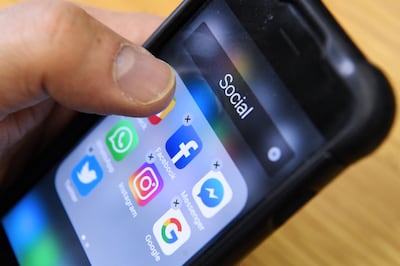Many social media influencers call the UAE their home, focusing on topics such as food, fashion, investment and lifestyle.
With the market proving increasingly powerful and popular, the Emirates continues to regulate the industry with a system of permits and fines for anyone earning money via social media platforms.
This week, it was clarified that influencers making money from operating in Abu Dhabi must obtain a permit specific to the emirate – in addition to the existing UAE-wide licence.
The National takes a closer look at the rules and regulations across the country, and how the latest piece of legislation might change things.
Abu Dhabi 'driving standards'
Unlicensed social media influencers also face fines of up to Dh10,000 ($2,720) under a new crackdown from authorities in Abu Dhabi.
Influencers who have registered as a company, which is often the case when a group want to work together as a collective, also face fines up to Dh10,000 and possible closure, if they are found to be operating without the necessary permits.
The measures come into effect in Abu Dhabi from July 1.
Licences can be bought through Tamm, the website for Abu Dhabi government services, and cost Dh1,250 for individuals.
Groups of influencers that work together and set up their own company will need to pay Dh5,000 for a permit.
Influencers operating in Abu Dhabi must also have a licence from the UAE Media Council, confirmed the Abu Dhabi Department of Economic Development.
“The permit fees are structured to accommodate both individual entities and companies seeking to engage in advertising and promotional activities in Abu Dhabi through electronic platforms,” an official told The National.
“In addition to obtaining a permit from the UAE Media Council, influencers and entities must also secure a licence from the Abu Dhabi Department of Economic Development.
“Obtaining both licences ensures adherence to both local regulatory standards and broader national guidelines governing media activities, contributing to the structured growth of digital advertising in Abu Dhabi.”

One expert who regularly works with influencers said the latest crackdown from authorities in Abu Dhabi would ensure a more level playing field.
“My personal feeling is that as an agency boss, this is very much needed to help drive standards and compliance in the industry which has been lacking,” said Natasha Hatherall-Shawe, chief executive of Dubai marketing company TishTash, who helps connect companies with influencers.
“At TishTash, we only ever work with those on a paid basis who have a trade licence and permit. This is something we check as part of our onboarding process as we would with any supplier.
“If an influencer does not have these, we will not work with them on a paid basis.
“I would estimate a quarter of influencers have a trade licence and a National Media Council licence. Most still work on a barter or gifting basis.”
She said her hope was the announcement from Abu Dhabi authorities would result in influencers being more transparent on posts that are paid or gifted, as is the case in the UK and the US.
In 2021, the Federal Tax Authority issued a bulletin with advice to influencers and artists, reminding them they must pay 5 per cent VAT if they earn more than Dh375,000 annually.
Services that are subject to the tax include any paid promotional work, such as plugging a product, company or place online. Physical appearances and access to influencers’ networks on social media are also taxable, it said.
They must also count the cost of any free products or experiences they receive in return for their services.
What about outside Abu Dhabi?
If you are making money from your social media posts anywhere in the UAE then you will need to apply for the licence from the National Media Council.
This costs Dh15,000 in Abu Dhabi and Dubai but the total costs can vary depending on which emirate you operate in.
If you are based in Dubai then you will also need an additional individual freelance trade licence, also costing Dh15,000 – bringing the total to Dh30,000.
When the licences were introduced to the UAE in 2018 it was also announced that those who failed to comply would face fines up to Dh5,000.
The Ras Al Khaimah Economic Zone website offers a social media influencer licence for Dh3,550 per year, which it says is inclusive of the National Media Council permit.
Ajman Media City Free Zone is offering packages for individuals to obtain licences from Dh2,500, and for companies the price is Dh10,000.
National Media Council approval then costs another Dh260 according to the free zone's website.
The need for licences
The UAE made it mandatory for social media influencers making money from posts they shared online to require a licence in 2018.

